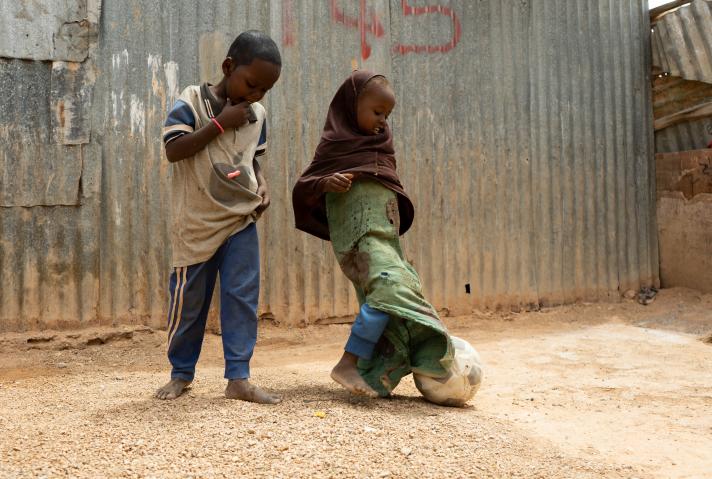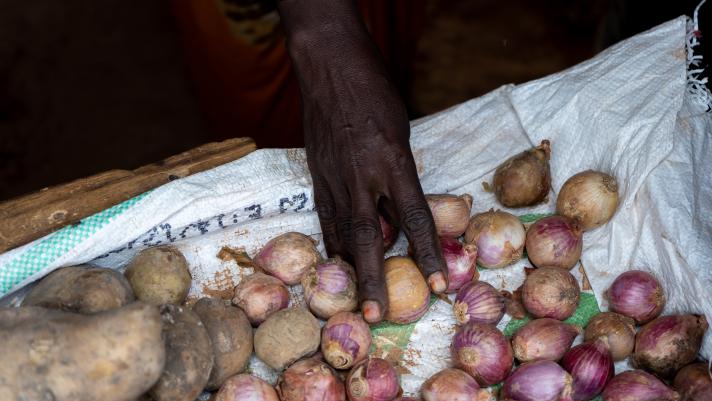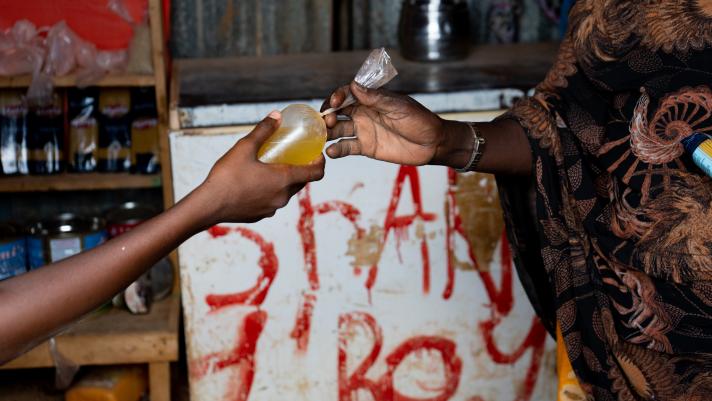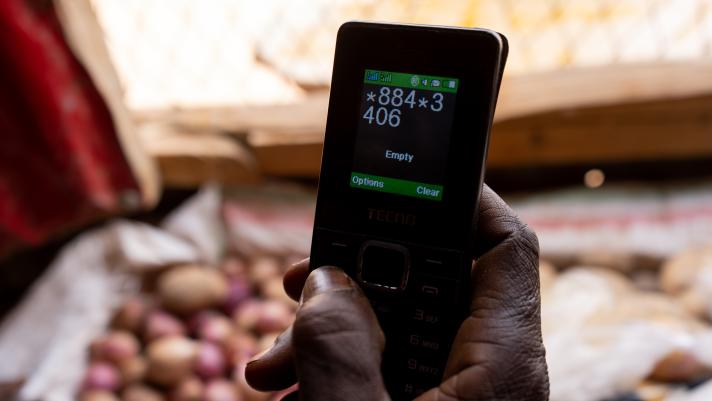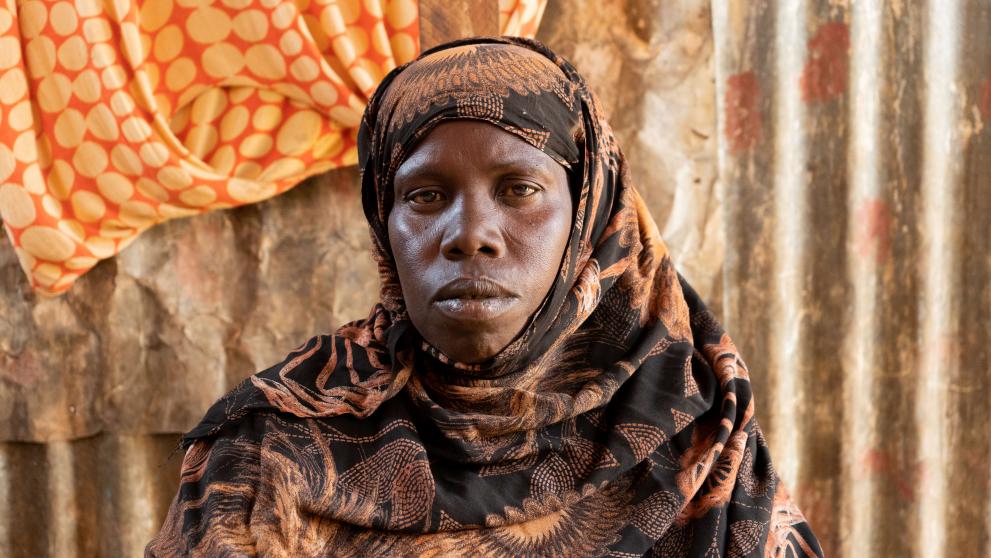
In the heart of north-eastern Somalia, in Garowe, within the confines of a camp sheltering Internally displaced People, you’ll find Xalima*, a determined 36-year-old mother. Her life is characterized the harsh realities of constrained finances and the unfulfilled dream of providing education for her children.
A Glimpse of Hope: The Transformative Power of Cash-Based Transfers
Amidst these trials, a ray of hope emerges, casting a bright light on Xalima’s path. It takes the form of a cash-based transfer initiative known as the Inclusive Local and Economic Development (ILED) programme. The initiative aims to improve the resilience of households to conflict and climate-related shocks and disasters, targeting 44,221 households, comprising 265,326 individuals. Among its beneficiaries are internally displaced persons (IDP’s), returnees, and host communities.
The project's core is cash-based social transfers, supported by government assistance for social protection delivery. These cash transfers serve as more than just financial lifelines, they stand as catalysts for better nutrition, reinforcing livelihood and food security as well and pioneering efforts to transform gender norms and dismantle barriers, especially for women.
Social transfer model one, aims to enhance human capital through the crucial first 1,000 days and enhance access to health and nutrition. Save the Children is supporting 6,292 pregnant and lactating mothers who receive regular, predictable, and reliable for 24 consecutive months with a transfer value of $20 per month per mother.
And so, in this story of trials and resilience, Xalima becomes a testament to the transformative power of a seemingly modest monthly sum. It is a tale of how this cash assistance, valued at just twenty dollars, infuses her life with newfound possibilities. It empowers her to secure clean water, nourishing groceries, and the essential provisions required to sustain her family. It is a story of unwavering determination, where setbacks merely serve as stepping stones on her journey to secure a brighter future for her children.
Life in the Internally Displaced Person Camp
In the makeshift homes of a camp for IDP’s, in the eastern part of Garowe, families grapple with the harsh reality that surrounds them. While the region has shown some progress in recent years, it remains besieged by numerous challenges.
The main challenges these IDPs are facing encompass housing shortages, food insecurity, water scarcity, protection risks and the struggle to withstand unforeseen shocks and risks.
‘‘Back in the days, about four to five years ago, what I was making was often enough to cover our family’s basic needs such as food and clean water, but other life necessities always seemed luxury to us, ‘’ said Xalima, a mother of ten, working as a cleaner, doing laundry and house cleaning services.
Dreams Deferred: Xalima's aspirations for her children and the cost of living
Xalima hoped to send her children to school but those hopes remained frustratingly out of her reach. The ability to cover school fees, purchase school uniforms, and books for her children seemed like a distant dream, far beyond the financial means of families like Xalima’s.
She expressed her heartfelt lament, stating:
‘‘I was not able to send my children to school, I could not afford their school fees, uniforms, books, and all that they might need, so while other children were learning, my children were staying at home and helping with chores or just playing in the house.’’
Despite her challenges, she declared with unwavering commitment:
‘‘Since I did not have the opportunity for education, I want my children to have that. I want them to have future better than the life I have lived. I firmly believe they would’’.
The cost of living has steadily risen, presenting significant obstacles to the vulnerable population living in the IDP camp. Basic essentials such as food and clean drinking water have become increasingly challenging to afford. Xalima remarked:
''In the past four years, the price of essentials continues to rise, while my income stayed static,’’ stated Xalima, ‘‘some days, we could only afford one meal a day.’’
A Lifeline in Tough Times: The impact of the $20 monthly cash transfer
A year ago, in the midst of a complicated pregnancy that necessitated bed rest leaving Xalima unable to work, she registered in a two years cash transfer project funded by the EU Emergency Trust Fund for Africa targeting pregnant and lactating women from poor households with the aim of providing regular cash assistance to improve their resilience and reduce poverty of marginalised households and communities in Somalia.
Every month, a much-needed sum of twenty dollars was deposited into her phone. While this amount fell short of meeting all their financial needs, it emerged as a vital lifeline for her family. She shared: ‘‘Normally, I receive the twenty on my phone on either the 27th or 26th of every month and it always come on the moment when we needed it the most,’’ shared Xalima.
This monthly transfer alleviated some of the burdens they face. Xalima explaines:
‘‘When we receive the amount, we prioritize clean drinkable water since the water sources in the camp are unsafe for human consumption and we also buy groceries and other food items as well as charcoal’’.
Tragically, Xalima experienced the loss of her baby during childbirth and for the four subsequent months, the cash transfer remained their sole source of income. Xalima expressed her gratitude saying:
’’I was grateful for still receiving the $20, since for the four months following my delivery, it was our only source of income.’’
After this gap in employment, Xalima made a determined return to work. However, she faced the difficulty in finding clients as most of her former clients had already turned to other service providers. Nonetheless, her resilience prevailed and she managed to secure new clients and provide stability for her family.
While the financial resources provided by the twenty dollars and her earnings were sufficient only to cover their basic needs, Xalima held onto her dream of educating her children. She affirmed:
’’I have not been able to send my children to school yet, because the twenty dollars and my earnings only covers the basic needs, but I am planning to enroll all of them except for the youngest one, in the upcoming school year.’’
More about the Project:
The overall objective of the programme "Inclusive Local and Economic Development” (ILED) funded by the Emergency Trust Fund for Africa is to contribute to stability in Somalia by extending state authority and services, promoting local reconciliation and peacebuilding, creating inclusive economic opportunities and protecting the most vulnerable.
The Social Transfers project (SAGAL) is executed by the Somali Cash Consortium, led by Concern Worldwide and assisted by partners including Save the Children International (SCI), Norwegian Refugee Council (NRC), and Danish Refugee Council (DRC), with the Ministry of Labour and Social affairs (MoLSA). The initative strives to enhance resilience, reduce poverty among marginalized households and communities, and bolster social, economic, and human capital. It also aims to facilitate access to productive activities for the most underprivileged youth in Somalia.
The approach revolves around two main components:
- Providing cash-based social transfers to targeted households, thereby reducing their vulnerability to shocks and disasters.
- Facilitating the establishment of systems at regional and district levels to implement a government-led social protection system.
*[1] Per Save the Children’s safeguarding policy, names were changed to protect the identity of the contributor.
Details
- Publication date
- 16 October 2023
- Author
- Directorate-General for International Partnerships
- Region and Country
- Horn of Africa
- Somalia
- Thematic
- Strengthening resilience of communities
- Partner
- Save the Children

